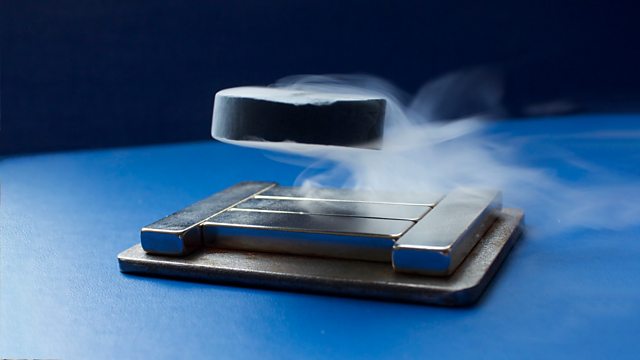Superconductivity
Melvyn Bragg and guests discuss ideas about why some materials lose their electrical resistance at low temperatures and expel their magnetic field and why that matters.
Melvyn Bragg and guests discuss the discovery made in 1911 by the Dutch physicist Heike Kamerlingh Onnes (1853-1926). He came to call it Superconductivity and it is a set of physical properties that nobody predicted and that none, since, have fully explained. When he lowered the temperature of mercury close to absolute zero and ran an electrical current through it, Kamerlingh Onnes found not that it had low resistance but that it had no resistance. Later, in addition, it was noticed that a superconductor expels its magnetic field. In the century or more that has followed, superconductors have already been used to make MRI scanners and to speed particles through the Large Hadron Collider and they may perhaps bring nuclear fusion a little closer (a step that could be world changing).
The image above is from a photograph taken by Stephen Blundell of a piece of superconductor levitating above a magnet.
With
Nigel Hussey
Professor of Experimental Condensed Matter Physics at the University of Bristol and Radbout University
Suchitra Sebastian
Professor of Physics at the Cavendish Laboratory at the University of Cambridge
And
Stephen Blundell
Professor of Physics at the University of Oxford and Fellow of Mansfield College
Producer: Simon Tillotson
Last on
LINKS AND FURTHER READING
READING LIST
James F. Annett, Superconductivity, Superfluids and Condensates (Oxford University Press, 2005)
Stephen J. Blundell, Superconductivity: A Very Short Introduction (Oxford University Press, 2008)
Gerald Burns, High-Temperature Superconductivity: An Introduction (Academic Press, 1992)
Michel Cyrot and Davor Pavuna (eds.), Introduction To Superconductivity and High-Tc Materials (World Scientific, 1992)
Kristian Fossheim, Superconductivity: Discoveries and Discoverers: Ten Physics Nobel Laureates Tell Their Story (Springer, 2015)
V. L. Ginzburg and E. A. Andryushin, Superconductivity (WSPC, 2004)
Robert Laughlin, A Different Universe: Reinventing Physics from the Bottom Down (Basic Books, 2006)
Susannah Speller, A Materials Science Guide to Superconductors (Oxford University Press, 2022)
RELATED LINKS
Broadcasts
- Thu 26 Jan 2023 09:00Βι¶ΉΤΌΕΔ Radio 4
- Thu 26 Jan 2023 21:30Βι¶ΉΤΌΕΔ Radio 4
Featured in...
![]()
20th Century—In Our Time
Browse the 20th Century era within the In Our Time archive.
![]()
Science—In Our Time
Scientific principles, theory, and the role of key figures in the advancement of science.
In Our Time podcasts
Download programmes from the huge In Our Time archive.
The In Our Time Listeners' Top 10
If you’re new to In Our Time, this is a good place to start.
Arts and Ideas podcast
Download the best of Radio 3's Free Thinking programme.
Podcast
-
![]()
In Our Time
Melvyn Bragg and guests discuss the ideas, people and events that have shaped our world.



